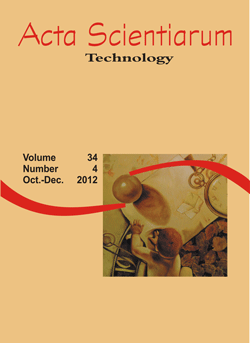<b>Item response theory in the production of indicators of socioeconomic metropolitan region of Maringá, Paraná State, Brazil</b> - doi: 10.4025/actascitechnol.v34i4.10478
DOI:
https://doi.org/10.4025/actascitechnol.v34i4.10478Palavras-chave:
latent variable, microdata 2000 Census, trustworthy questionnaireResumo
This study aimed to identify and produce through models of Item Response Theory (IRT) a socio-economic indicator based in the items observed in 2000 Census, following the methodology by Soares (2005). By the IRT Methodology, this indicator, as a latent variable, is obtained through the construction of specific models and scales, making it possible to measure this variable, which according to Andrade et al. (2000), IRT analyzes each item which compose the measuring instrument. This case consists of binary or dichotomous items, which assess the possession of certain assets of domestic comfort. The characteristics of each item were analyzed, as the ability to discrimination and income necessary for the possession of certain property. It was concluded that with 13 items, a trustworthy questionnaire can be done for the construction of a socioeconomic index of Maringa´s metropolitan region.
Downloads
Downloads
Publicado
Como Citar
Edição
Seção
Licença
DECLARAÇíO DE ORIGINALIDADE E DIREITOS AUTORAIS
Declaro que o presente artigo é original, não tendo sido submetido í publicação em qualquer outro periódico nacional ou internacional, quer seja em parte ou em sua totalidade.
Os direitos autorais pertencem exclusivamente aos autores. Os direitos de licenciamento utilizados pelo periódico é a licença Creative Commons Attribution 4.0 (CC BY 4.0): são permitidos o compartilhamento (cópia e distribuição do material em qualqer meio ou formato) e adaptação (remix, transformação e criação de material a partir do conteúdo assim licenciado para quaisquer fins, inclusive comerciais.
Recomenda-se a leitura desse link para maiores informações sobre o tema: fornecimento de créditos e referências de forma correta, entre outros detalhes cruciais para uso adequado do material licenciado.



















